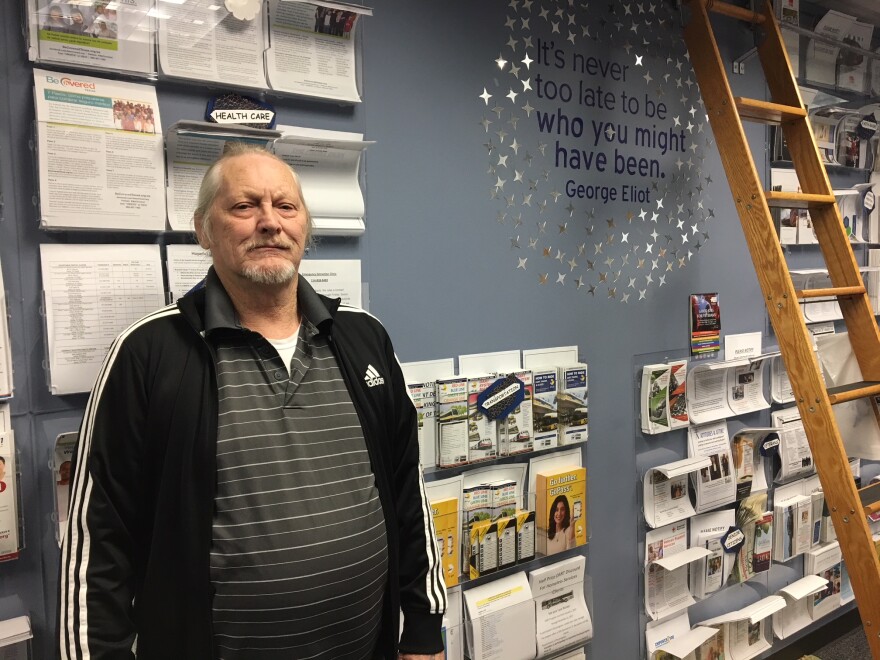When people are arrested and can't afford to bail themselves out, they can sit in jail for days or even weeks awaiting trial. That may cost them their house, job or kids.
A 21-year-old SMU student is trying to level the playing field by starting a bail fund of his own.
Losing out during lockup
Back in the 1970s, Bennie Baker was stopped by police while walking to the grocery store. They found a marijuana cigarette in his shirt pocket and placed him under arrest. He was supposed to start a caretaker job at Texas Instruments the very next day. Instead, he spent close to a week in jail, and when he got out, that job was gone.
"It went away, you know? That started my criminal record right there," Baker said.

Since then, Baker says he's been arrested a handful of times — for things like driving with a suspended license, displaying a fictitious state inspection sticker and burglary.
Since that first arrest 40 years ago, he hasn't had much luck finding traditional work.
"I bought and sold scrap metal, and if you miss a few days of that you're broke, basically. And it's hard to make bail if you don't have a steady job, a weekly paycheck coming in," he said.
Baker says sometimes he beat the charges filed against him, but he still had to sit in jail and wait for a judge to hand down the verdict.
What jail can cost
Dallas County's Chief Public Defender, Lynn Richardson, says waiting out an arrest in jail can cost someone more than a job.
"If they have children and they're single parents and they don't have family that can come and take those kids, there's a possibility they could lose their kids," she said. "CPS will take them into custody."
Which means some parents lose their children because they can't come up with, say, $700 in bail money. For some of those people, borrowing the money isn't an option either. Bail bondsmen require 10 percent up front, and that money is gone for good.

"Even when you get a bondsmen and you take care of your case and your case has been resolved, you're not going to get that 10 percent back," Richardson said. "And some people, quite frankly, don't have that 10 percent."
And remember, just because someone is arrested doesn't guarantee conviction.
Some people are found innocent; sometimes charges aren't even filed. Guilty or not, some low-income people still have to wait it out in jail.
College student schemes solution
Greg Guggenmos has interned at a few policy-focused think tanks and has worked as a lobbyist for the Texas Homeschool Network.
Most recently, he launched a community bail fund that will give small grants to people facing charges who can't afford to post bond, so they won't have to wait out their trials behind bars. By the way, he's 21 years old.
"There's thousands of people sitting in the Dallas County jail because they can't pay for bail. And it's not because they're a threat to society, it's not because they are dangerous to themselves or others, it's because they're poor," Guggenmos said. "And I felt like that was wrong and no one else was changing it, so I felt like I could, so might as well step up."

Guggenmos is a semester and a half away from getting both his bachelor's and master's degrees from SMU. He hasn't yet handed out grants but plans to once his fundraising goal is met.
A GoFundMe page is raising additional money.
The state has officially recognized the "Community Bail Fund of North Texas" as a nonprofit.
It's real, if small. Guggenmos hopes that won't be the case for long.
"You know, instead of five people at a time, we'd love to be helping 50 people at a time, or 500 people at a time," he said.
A small step toward solving a big problem?
Since the Dallas County Public Defender's Office handled 30,000 adult criminal cases last year, 500 bail grants would make a much bigger dent than five. Lynn Richardson says seeing this project get off the ground is heartening.
"And to think that he is committed enough to do this is just very encouraging to me, that there are people out there that recognize the disparities in the system and are willing to actually do something about it," she said. "Not just talk about it, but to actually do something about it."
That's what it's all about for Greg Guggenmos, taking action. He says he saw an issue that needed fixing, and simply raised his hand.





